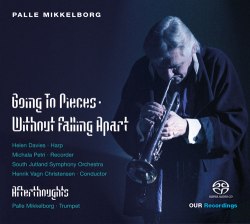|

Support
us financially by purchasing this disc from |
|
|
|
|
|
Palle MIKKELBORG (b.1941)
Going to Pieces · Without Falling Apart - Concerto for harp, recorder and string orchestra (2004 rev 2012) [55:10]
Afterthoughts (2012) ¹
Helen Davies (harp): Michala Petri (recorder)
South Jutland Symphony Orchestra/Henrik Vagn Christensen
Palle Mikkelborg (trumpet); orchestrations by Thomas Li ¹
rec. December 2012, Alsion Concert Hall, Sønderborg, Denmark; Afterthoughts recorded and mixed by Thomas Li in January 2013 in MyRoomStudio, Østerbro
OUR RECORDINGS 6.220607 [55:10]
Palle Mikkelborg was winning awards as long ago as 1968, when he took the Danish Jazz Musician of the Year prize. He remains a trumpeter of great thoughtfulness, lyricism and inimitable tone. The concerto Going to Pieces · Without Falling Apart - the title derives from a book by Mark Epstein, and I’ve faithfully copied the disc’s punctuation - was composed back in 2004 for harp, violin and string orchestra but was revised for harp and recorder in 2012, and it’s in the revised version that we hear this 12-movement concerto.
Much like his trumpet playing, which helped inaugurate a new sound in Scandinavian brass playing, the music is suffused in vaporous beauty. Lightly but precisely orchestrated, each of the movements bears an evocative title and whilst these need not be taken wholly literally they are useful indices of the composer’s imaginatively compressed ideas and feelings; some are bardic, some lovely and dancingly patterned, crisply alive, with thrumming harp and piping alert recorder. Others, still, enshrine deft colour and interplay, delicacy or sonorously warmly textured romantic breadth. Some of the music, too, is slightly filmic, other sections waltz-like animated by the refined orchestral and soloistic palette which veers against any kind of bombast. And yet section 8, A spiritual carousel, bursts forth into a dashing tango. There’s one moment in movement 11 where overdubbed voices play their part in the brisk narrative. It’s appropriate that the concerto - it’s a novel kind of concerto - should end with a waltz since the music often looks to the condition of dance whilst co-opting reverie and nostalgia as co-conspirators.
You will need to be attuned to Mikkelborg’s sound-world to appreciate this piece. Those unsympathetic to it might think it pallid or too inclined to a certain amorphous quality. But if you like it - and it’s obvious from the foregoing that I did, and do - you will surely admire its deft detailing, its beautiful solo writing, and the many moments offered for contrast of mood and rhythm. For all that it remains unsplintered, a reverie that summons up time and place - some African, some Chinese, some Irish - without becoming frustratingly modish or unfocused. In all respects the two well-known soloists acquit themselves with distinction, evoking textures and moods with ceaseless refinement.
To cap this there is a piece called Afterthoughts in which Mikkelborg distils the essence of his concerto into a trumpet-and-orchestral fabric, orchestrated by Thomas Li. Fundamentally lyrical, it’s a pleasure - beyond even hearing the thematic connections - to hear again that fabled trumpet tone. Outstanding sonics and production values ensure a winning disc.
Jonathan Woolf
 |
 |
|



 All Nimbus reviews
All Nimbus reviews








